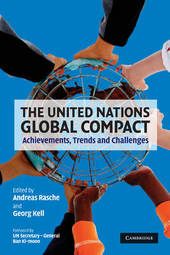
|
The United Nations Global Compact: Achievements, Trends and Challenges
Paperback / softback
Main Details
| Title |
The United Nations Global Compact: Achievements, Trends and Challenges
|
| Authors and Contributors |
Edited by Andreas Rasche
|
|
Edited by Georg Kell
|
|
Foreword by Ban Ki-moon
|
| Physical Properties |
| Format:Paperback / softback | | Pages:472 | | Dimensions(mm): Height 228,Width 153 |
|
| Category/Genre | Business and management |
|---|
| ISBN/Barcode |
9780521145534
|
| Classifications | Dewey:341.23 |
|---|
| Audience | | Professional & Vocational | |
|---|
| Illustrations |
5 Tables, black and white; 23 Line drawings, black and white
|
|
Publishing Details |
| Publisher |
Cambridge University Press
|
| Imprint |
Cambridge University Press
|
| Publication Date |
16 June 2010 |
| Publication Country |
United Kingdom
|
Description
The United Nations Global Compact is a strategic policy initiative that encourages businesses to support ten universal principles in the areas of human rights, labor standards, the environment, and anti-corruption. It is the world's largest voluntary corporate responsibility initiative with more than 7,500 business and non-business participants in over 130 countries. This book reviews the first ten years of the Compact's existence (2000-2010) by presenting exclusively commissioned chapters from well-known scholars, practitioners from the business world and civil society, and Global Compact staff. They reflect on what the Global Compact has achieved, what trends it may have to respond to, and what challenges are ahead. The book contains not only up-to-date reflections but also debates recent changes to the structure of the Compact, including the Communication on Progress policy, the role of Global Compact Local Networks, and the role of emerging specialized initiatives.
Author Biography
Andreas Rasche is Assistant Professor of Business in Society at Warwick Business School and since 2007 has worked as a consultant to the United Nations Global Compact Office in New York. He received his PhD in Strategic Management and Corporate Responsibility from the European Business School, Germany. His research focuses on global governance and transnational organizational regulation in the context of contested global issues. He has published widely in leading international journals on corporate responsibility and has guest edited special issues of various journals. Georg Kell is the Executive Director of the United Nations Global Compact. His career with the United Nations began in 1987 at the UN Conference on Trade and Development (UNCTAD) in Geneva. In 1997, Mr Kell joined the Office of the UN Secretary-General in New York, where he spearheaded the development of new strategies to enhance private sector engagement with the work of the United Nations. As one of the Global Compact's key architects, he has led the initiative since its launch in 2000. A native of Germany, he holds advanced degrees in economics and engineering from the Technical University of Berlin.
Reviews'This timely book reviews the UN Global Compact's strengths and shortcomings over its first decade and provides helpful guidance for all committed to mainstreaming responsible business practices and achieving real change through multistakeholder initiatives.' Mary Robinson, President of Realizing Rights: The Ethical Globalization Initiative, Former President of Ireland and UN High Commissioner for Human Rights 'By orders of magnitude, the Global Compact is the world's largest corporate citizenship initiative - and one of the United Nations' true success stories. As such, it deserves a comprehensive analysis. With this book, it has got it. Encyclopedic in scope, the volume touches on all facets of the Global Compact's ideas, ideals, innovative organizational modalities and impact. It will be an indispensable reference work, and an inspiration to global norm entrepreneurs in every field, for many years to come. It is a 'must-read' for anyone interested in sustainable globalization, which includes most if not all of us.' John G. Ruggie, Harvard University and Special Representative of UN Secretary-General on Business and Human Rights 'This book offers an invaluable and reflective look back at the first decade of the UN Global Compact and perspectives on what lies ahead. As such, it definitely deserves a place in the bookshelf of corporate managers, policy makers, civil society representatives, and especially scholars interested in corporate responsibility.' Business and Society
|